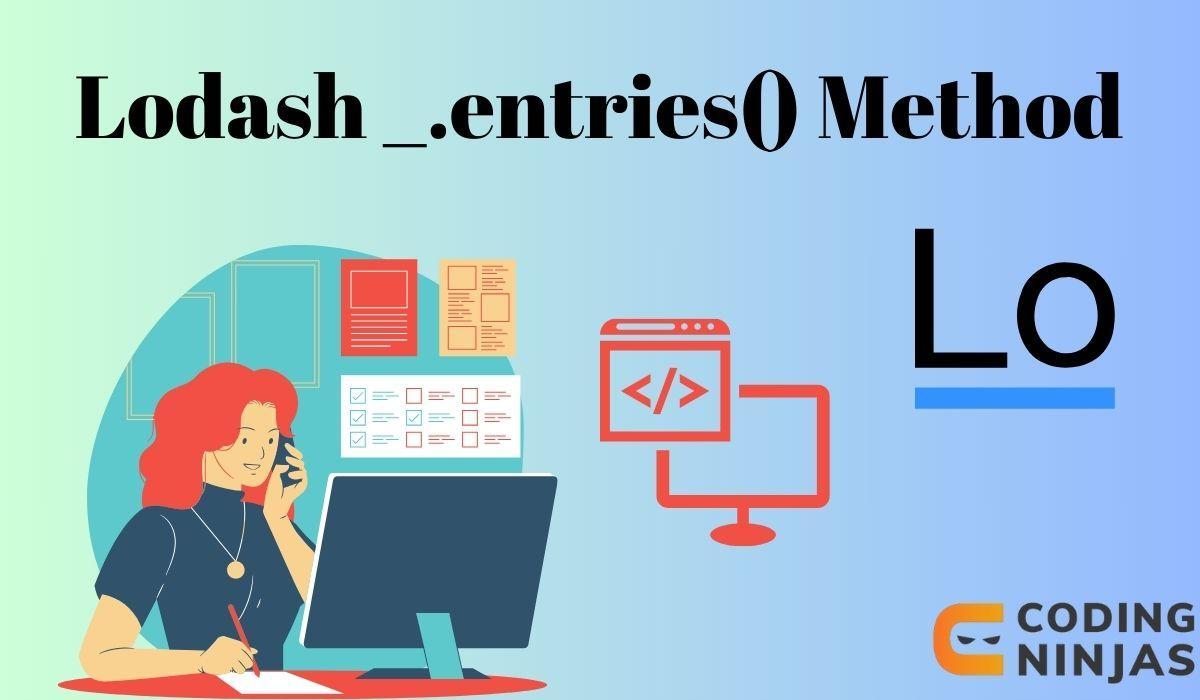Syntax, Parameter and Return Value
Syntax:
_.entries(object)
Parameters:
object (Object): The object to convert.
Return Value:
(Array) - Returns the array of key-value pairs.
Examples
Basic Conversion to Entries:
JavaScript
var _ = require('lodash');
var object = { 'a': 1, 'b': 2, 'c': 3 };
console.log(_.entries(object));

You can also try this code with Online Javascript Compiler
Output:
[['a', 1], ['b', 2], ['c', 3]]
Demonstrates converting an object into an array of [key, value] pairs.
Iterating Over Entries:
JavaScript
var user = { 'name': 'John', 'age': 30, 'active': true };
_.entries(user).forEach(([key, value]) => {
console.log(`${key}: ${value}`);
});

You can also try this code with Online Javascript Compiler
Output:
'name: John', 'age: 30', 'active: true'
Shows how to iterate over an object's entries for logging or other processing.
Transforming Object to Map:
JavaScript
var settings = { 'theme': 'dark', 'layout': 'grid' };
var settingsMap = new Map(_.entries(settings));
console.log(settingsMap.get('theme'));

You can also try this code with Online Javascript Compiler
Output:
'dark'
An example of transforming an object into a Map for easier value retrieval.
Combining with Other Lodash Methods:
JavaScript
var scores = { 'Alice': 85, 'Bob': 90, 'Clara': 88 };
var formattedScores = _.chain(scores)
.entries()
.map(([name, score]) => `${name}: ${score}`)
.join(', ')
.value();
console.log(formattedScores);

You can also try this code with Online Javascript Compiler
Output:
'Alice: 85, Bob: 90, Clara: 88'
Demonstrates combining _.entries() with other Lodash methods for data formatting.
Frequently Asked Questions
How does _.entries() differ from Object.entries() in JavaScript?
_.entries() is Lodash's implementation and is similar to Object.entries(). The primary difference is that Lodash methods work seamlessly with other Lodash utilities, providing consistency in a Lodash-based codebase.
Can _.entries() handle nested objects or arrays?
_.entries() will convert nested objects or arrays into entries as-is, without recursively transforming them. For nested structures, additional processing might be needed.
Is _.entries() efficient for large objects?
_.entries() is generally efficient for most use cases, but performance should be considered when dealing with very large objects or when performance is a critical factor.
Conclusion
Lodash's _.entries() method provides a straightforward and readable way to convert an object into an array of its own enumerable properties as [key, value] pairs. It's particularly useful for iterating over objects, transforming them into other data structures, and for integrating with Lodash's functional programming utilities.
You can refer to our guided paths on the Coding Ninjas. You can check our course to learn more about DSA, DBMS, Competitive Programming, Python, Java, JavaScript, etc.
Also, check out some of the Guided Paths on topics such as Data Structure and Algorithms, Competitive Programming, Operating Systems, Computer Networks, DBMS, System Design, etc., as well as some Contests, Test Series, and Interview Experiences curated by top Industry Experts.





